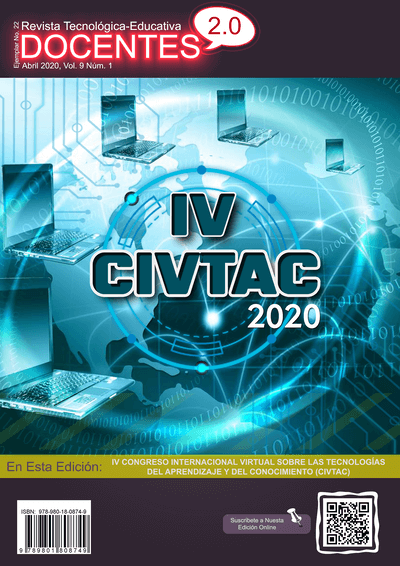Knowledge, application and integration of ICT - CT and PET by university yeachers in the city of Ambato
 DOI:
https://doi.org/10.37843/rted.v9i1.101
DOI:
https://doi.org/10.37843/rted.v9i1.101
Main Article Content
Abstract
Technology is not something of recent times, it has become the engine that moves the development of knowledge from the origins of man, the accelerated development of these, has generated transformations within the educational environment, playing a primary role in the teaching processes - learning Under this context, this research aims to: Determine the level of knowledge, application and integration of ICT / CT / PET by university teachers in the city of Ambato. The methodological design of this research is mixed with a descriptive - cross-sectional study through the qualitative - quantitative perspective. The study population represented 250 university teachers from the city of Ambato. For the analysis, criteria established based on guidelines of the ICT Competencies Pentagon (MEN, 2013) were considered, where the five competencies that the teacher should develop at the ICT / CT / PET levels are presented: Technological, Pedagogical, Communicative, Management and Research Among the main findings, it is determined that university teachers have an average level of knowledge of ICT (96%), TAC (55%) and PET (26%); ICT application (77%), TAC (28%) and PET (13%); and, of ICT intervention (68%), TAC (15%) and PET (6%).
Downloads
Metrics
Article Details

This work is licensed under a Creative Commons Attribution-NonCommercial-NoDerivatives 4.0 International License.
Those authors who have publications in our journal accept the following terms:
- When a work is accepted for publication, the author retains rights of reproduction, distribution of his/her article for exploitation in all countries of the world in the format provided by our magazine and any other magnetic medium, optical, and digital.
- Authors will retain their copyright and guarantee the journal the right first to publish their work, which will be simultaneously subject to the Creative Commons Acknowledgment License (Attribution-NonCommercial-NoDerivatives 4.0 International (CC BY-NC-ND 4.0)). That allows third parties to copy and redistribute the material in any medium or format, under the following conditions: Acknowledgment - You must properly acknowledge authorship, provide a link to the license, and indicate if any changes have been made. You may do so in any reasonable way, but not in a way that suggests you have the licensor's endorsement or receive it for your use. NonCommercial - You may not use the material for a commercial purpose. NoDerivatives - If you remix, transform, or build from the material, you cannot broadcast the modified material. There are no additional restrictions - You cannot apply legal terms or technological measures that legally restrict you from doing what the license allows.
- Authors may adopt other non-exclusive license agreements to distribute the published version of the work (e.g., deposit it in an institutional archive or publish it in a monographic volume) provided that the initial publication in this journal is indicated.
- Authors are allowed and recommended to disseminate their work through the Internet (e.g., in institutional telematic archives, repositories, libraries, or their website), producing exciting exchanges and increasing the published work's citations.
- Request of withdrawal an article has to be done in writing by the author to the Editor, becoming effective after a written response from the Editor. For this purpose, the author or authors will send correspondence via e-mail: [email protected].
- The author will not receive financial compensation for the publication of his work.
- All Docentes 2.0 Journal publications are under the Open Journal System (OJS) platform at: https://ojs.docentes20.com/.
References
Área, M., Gutiérrez, A., & Vidal, F. (2017). Alfabetización digital y competencias informacionales. Fundación Telefónica, 14-27.
Chero, A. (2018). TIC, TAC, TEP, TIP, TRNA. http://bblanube.blogspot.com/2018/12/tip-y-trna.html
Dolors, R. (2016). Cuadernos de pedagogía, ISSN 0210-0630, N.º 473, 2016. Ejemplar dedicado a: La escuela es la vida. Acercar los aprendizajes al mundo real. 24-27
Enríquez, S. (2017). Luego de las TIC, las TAC. Argentina: Facultad de Humanidades y Ciencias de la Educación, Escuela de Lenguas.
Espinosa, R., & Rodríguez, R. (2017). El uso de las TIC, TAC, TEP para desarrollar competencias empresariales y comunicativas en los estudiantes universitarios. Revista TECSISTECATL.
http://www.eumed.net/rev/tecsistecatl/n21/tic-tac-tep.html
Fuentes, M. (2015). Innovar desde las tecnologías de la información y la comunicación. Revista Iberoamericana de Educación a Distancia, 37-47.
Garduño, E. (2014). Tecnologías en la educación. http://tecnologiaseducativasuagro.blogspot.com/2014/03/la-evolucion-de-las-tecnologias-en-la.html
Heidegger, M. (1976). Caminos de bosque. Experiencias del pensar. Traducción de Lara. F. (2014). Colección Lecturas, Serie Filosofía. 50. Abada.
Hernández, C. (2018). Práctica pedagógica y competencias TIC. DOI:10.18041/2382-3240/saber.2018v13n1.2090
Hurtado, J. (2014). Metodología de la Investigación Holística. Caracas, Venezuela: Fundación Sypal.
Lozano, R. (2011). De las TIC a las TAC: tecnologías del aprendizaje y del conocimiento. Anuario ThinkEPI. https://recyt.fecyt.es/index.php/ThinkEPI/article/viewFile/30465/16032
Palacios, J. (2019). Retos de la educación en la era del TIC, TAC, TEP. https://ensegundos.com.pa/2019/04/02/retos-de-la-educacion-en-la-era-del-tic-tac-tep/
Pinto, A., & Díaz, J. (2015). Convivencia Escolar en la era de la hiperconectividad. Revista Cultura, Educación y Sociedad, 6(1), 149-164.
Rodríguez, E. (2018). TIC, TAC y TEP: qué son, diferencias y similitudes. https://www.compartirpalabramaestra.org/actualidad/blog/tic-tac-y-tep-que-son-diferencias-y-similitudes






